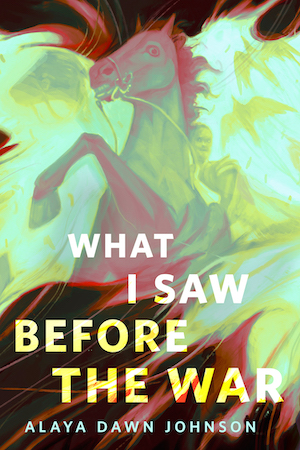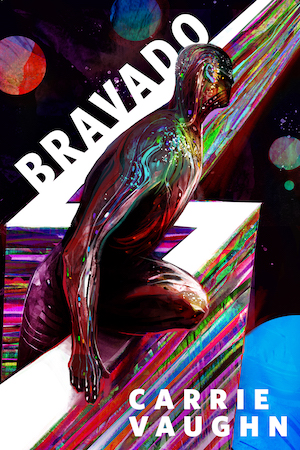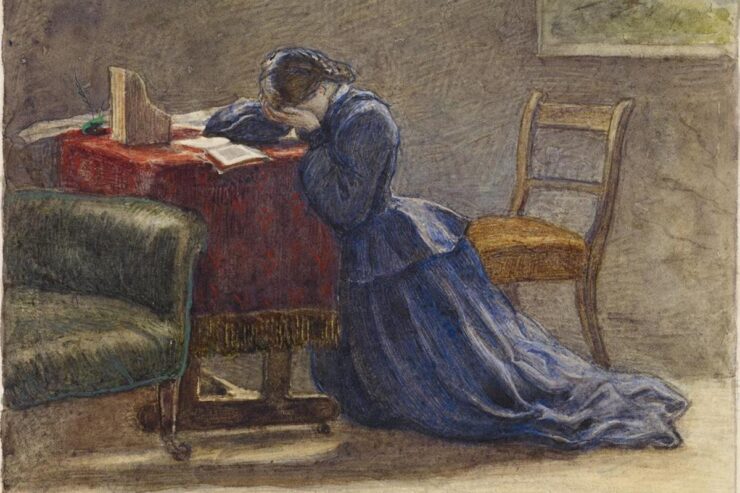Lately, I’ve been in limbo. Entertainment limbo, a modern purgatory for a Goldilocks who has too many options, none of them quite right. This show is too slow. This show came out all in one drop and now feels irrelevant. This movie is too long; that one, too restrained. Books are a little more accessible, to my unsatisfied brain. So many of them are many things at once: terrifying, wise, funny, prophetic, clever, beautiful. I find it easier to give books a chance than movies or series, which is not how my brain usually works. I like a balanced diet, you know? A little bit of everything. But everything isn’t working. Do you know that feeling? When you want an experience, but you want to know it’s going to be An Experience? A bundle of feelings, thrown in your lap, undeniable?
So I went to see Children of Men on the biggest movie screen in Portland. This was not the experience of seeing that movie in a tiny, afterthought of a theater in a shopping mall when it arrived in 2006. This was large, and immersive, and still, after all these years, astonishing. It remains an artistic and technical triumph, and also one of the greatest examples of how an adaptation can, in fact, improve upon its source material.
When I left the theater, walking out into incomprehensible daylight—surely it had gotten dark; surely it was night, by now, better to hide my expression—I asked, out loud, “Why did I want to do that again?” And then the answer: “Because I wanted all those feelings.”
I am in search of big feelings. But not just any big feelings. The big feelings once associated with characters saving the world have dimmed and shrunk; too many stories about saving the world, the galaxy, the universe; too many teams of interchangeable heroes; too many ever-more-grandiose villains trying to enact their outrageous evil plots via powers that should make them unstoppable—but lo, the heroes pull it off! When you repeat the same big feelings formula too many times, it takes the edge off. Everyone is saving the world, on screen. Out here it just makes me despondent: The planet’s enemies are more subtle than Thanos. Not subtle at all, really, but still more subtle than that guy.
I wonder, sometimes, if the desire for big feelings is part of the lure of the thriving romantasy subgenre. Those, too, are specific big feelings, and not usually the ones I’m looking for. But they resonate with so many: big love affairs, maybe some big world-saving on the side. Good and evil and grand sweeping gestures and grand sweeping wingspans. I’m a little bit jealous of the romantasy lovers; they’ve got big feelings on a platter right now. But I’m happy for them, too.
Where do you look for big feelings? I’ve been thinking about feelings, and feelings in pop culture, nonstop since reading Heather Havrilesky’s Ask Polly piece from earlier this month. “The Rise of Emotional Divestment” is about so many things I find it impossible to sum up. It’s about everything we’re experiencing these days: the ignored but still present pandemic, the world’s horrors, the world’s indifference to said horrors, the picking apart of mistakes, the distance from other people. (Havrilesky also wrote a great and related piece in The New York Times in defense of tearjerkers.)
One of many sentences that grabbed me: “These days, we digest sadness alone with our phones.” This is not always true, no; nothing is always true. But do you want to pick a sentence like that apart for every letter of truth or imperfection, or do you want to think about how often it is true? I can’t tell you how many times a day I am staring in horror at something on my phone or laptop, and no matter how many other people are also staring in horror at that thing, somewhere, many of us are sitting alone. We look, and we look, and then there’s another thing, and another, and then eventually you close the app or the tab, and then what? You’re still alone.
I understand that for some of us, everything happening in the world right now has the opposite effect: fewer feelings, please. Please, put some back. But I want those fictional feelings that become real as they bubble and steam in my chest. They are like practice feelings; they are at once an escape and an outlet for “real-world” feelings I don’t know what to do with. Horror and grief goes into the reading or watching experience, and comes out the other side a little changed, somehow. Not easier—I am not looking for easy—but like I have discovered some unexpected nuance in my own ability to feel. There’s more to it. And sometimes I just want to feel a big feeling that isn’t horror or fury. Sometimes I want sneaky feelings, like the ones tucked into The Good Place when you least expect them.
Sometimes I too wish to give no fucks. To lie on the ground, inert, unfeeling. To take a little emotional nap from all of it: real feelings, fiction feelings, the cumulative grief of the last immeasurable span of time. But then I rise up, again, in search of the big feelings, the ones that don’t feel manufactured or paint-by-numbers or like the latest watered-down offshoot of something that elicited big feelings in people some time back. I want the fresh, vibrant, vulnerable, messy, terrible, crushing, incredible big feelings we are all, still, feeling, somewhere, even when they’re hard to access. I want catharsis.
“We don’t have the patience for anything, let alone the slow unfolding of human emotion,” Havrilevsky writes. This is it: this is the big feeling I want. The slow unfolding of a character’s reaction to their world. Micaiah Johnson’s narrator, in Those Beyond the Wall, leaps off the page, a mess of feelings and fury, but the extent of her story unfolds slowly, changing the novel from a murder mystery to a revolution. Wicked, the book, is a slow unfolding of grief. It is hard to say, really, exactly which books, which stories, fit this bill, because that unfolding works differently for everyone. I’ve read two books that aren’t out yet—Rakesfall and The Mercy of Gods—in which the unfolding is so intense that I haven’t yet worked out what feelings, exactly, they unfold within me. And that’s a thing to treasure: a story delivering feelings that take time to understand.
I catch myself, while writing about big feelings, trying to refrain from yelling and shouting, like one must be calm and reasonable while thinking Please I would just like something that makes me sob, but in a good way! I want to know where you find that. What book last reduced you to tears? What took your breath away or made your heart race? What left you pondering humanity’s own horrors alongside those of an alien culture? What filled your well, inspired you, reminded you that someone else has been through loss and rejection and sadness? Where are the big feelings hiding?











I like your article. I too am tired of all the superhero movies where in the process of defeating the villain, the two of them destroy half the city.
Now with the villain destroyed everything is supposed to be good now. Sorry, no. It would take generations to rebuild what was destroyed. If it is even possible anymore. Just like what is going on in the Ukraine. Suppose Russia wins. What do they win? I guess the powers that be are not aware that there is a world wide shortage of the proper kind of sand in order to make concrete. What will they make the buildings with. But even more important, however will the societies involved overcome all the ” big emotions” like hate and fear and shame etc. as a result of the war.
So for big happy feelings I resort to old movies on TCM. Movies wherein the people seemed to care for each other even in times of great difficulty. To end this I’ll just mention one that makes me feel good every time I watch it: ” These Vines Have Tender Grapes” . It comes from the 1940s and stars Edward G. Robinson. And the last book read recently? Speaker For The Dead by Orson Scott Card.
80% of my reads are romance so I guess i’m chasing after the Big Feelings, even though they’re mostly of the happy kind…
The last thing that brought me to tears, ironically, is a very serene Christmas CD (Stille Nacht – RIAS Kammerchor).
Es kommt ein Schiff geladen (youtube.com)
Otherwise, more visceral: Rachmaninov’s 2nd piano concerto and Prokofiev’s 3rd piano concerto.
I think this is one of the reasons I’ve fallen so hard for Farscape, which I’m currently watching for the first time. It’s so nakedly emotional at all times; people are near tears like twice per episode. It’s exactly what I’ve been needing. Oh, and a book rec — Ferdia Lennon’s Glorious Exploits slammed the shit out of me in this regard. Reading it elicited strong emotion, but beyond that, it’s about the massive emotions art can create in us. So so good.
Wondrous storytelling. Claudia Black’s character in particular describes an amazing arc.
For big and bittersweet feelings, there’s no one better than Tanith Lee, especially “Biting the Sun” and “The Silver Metal Lover.”
The Winners by Fredrik Backman made me SOB SO HARD and feel so many feelings. In other entertainment I had to parcel out watching Heartbreak High on Netflix because each episode made me feel really big feelings.
I just finished The Wizard’s Handbook for Surviving Medieval England by Brandon Sanderson (standalone, not part of the Cosmere, so you can jump right in), which sounds comic and is pretty funny, but the protagonist’s character arc wrenched something in me, the way it captured the despair of continually falling short even when you’re trying to be more, the fear of failure and the tug of war as you question if it’s your fault or if life is just against you, and in either case, what do you do?
The other book that comes to mind when I think of stories that really made me feel is Robin Hobb’s the Assassin trilogy. It was good, but something about it tore up my heart into little pieces, and I could never read any of her other books. That was more than five years ago, and I still get a whiff of grief when I think about it.
I also have mixed feelings about superhero movies (and other grand-scale world-saving stories), because on the one hand, I love the drama of the world being at stake, but reducing it to a big action scene that’s just about how cool it looks and doesn’t acknowledge the consequences (like what about civilian casualties) cheapens it.
I think that’s why I still enjoy the climax of the Lord of the Rings but have never re-watched Marvel’s Infinity War and Endgame because in LotR, there’s the big battle, but the point isn’t seeing a couple of larger-than-life figures duking it out while tiny, helpless civilians try not to get crushed. It’s about regular soldiers stepping up and putting their lives on the line to buy time for other regular people to complete the world-saving mission.
I think what I’m trying to say is that I want less spectacle (or not spectacle alone) and more character focus. I want to see the characters struggle to do something really difficult whether it’s as big as saving the world or as small as choosing to put one foot in front of the other. But I want to see the person, not just the scene.
I’m a huge romance reader, so like another posted commented, I’m always chasing the feels. I
I had gobs of big feelings when I first watched Heartstopper on Netflix. I sobbed at the end of E3 in S1, and again at the end of E8, when Nick comes out to his mom, and we get a flashback to when Nick first meets Charlie.
For music, pianist Helen Jane Long evokes strong, almost indescribable big feelings within me. It feels like her music is scrambling my atoms and putting them back together in a whole new way.
Two books I still think about two months after reading them are The Door to Door Bookshop (which had me crying in the back of a friend’s car, albeit not sobbing) and What You Are Looking For Is In The Library. Similar but different, they gave me feelings and talked about their character’s feelings and I love them so so much.
I’m one of those “I don’t have enough emotions to spare” because in addition to *waves vaguely at ‘all this’* I’m dealing with some medical and legal issues. So I’ve been reading a whole lot of Romantasy because I NEED to know there will be a happy ending, that the cat will be OK, that they will save the farm, that at least for now people will be happy, or at least content.
But I also understand the “Practice emotions” kind of thing. In the early days of the pandemic, my husband “leaned in” by reading more horror, where my emotional levels were more “Fluffy Bunny Has A Picnic”.
But you are right to point out the need for catharsis, and maybe I need to think a bit more about owning my emotions rather than hiding from them.